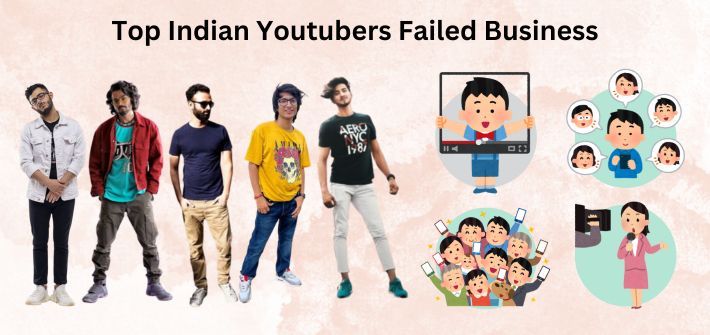Many popular Indian YouTubers have enterted into business, but not all succeeded. They have large followings audience, challenges in transitioning from content creation to business led to setbacks. Here’s an overview of the top 10 Indian YouTubers who launched business ventures that unfortunately didn’t succeed as expected.
CarryMinati (Ajey Nagar)
BB Ki Vines (Bhuvan Bam) Failed Youthiapa Business
Bhuvan Bam, the creator behind BB Ki Vines, launched YOUTHIAPA, a merchandise brand designed to connect with his large fanbase. The brand struggled due to high pricing and limited scalability, which prevented it from reaching a broad audience. In the initial stage, fans showed interest but the long-term sales was challenging for the YOUTHIAPA. The brand faced lots of competition in the apparel and merchandise space, where established brands and lower-cost alternatives made it hard for YOUTHIAPA to survive in this industry.
Be YouNick (Nick) failed Thisiskra business
Be YouNick (Nick), known for his comedic sketches, launched Thisiskra fashion business, a clothing and lifestyle brand aimed at his audience. Despite Nick’s large following, Thisiskra faced challenges in establishing a unique brand identity in a competitive fashion market. Limited brand awareness and difficulty in scaling led to struggles with visibility and sales. The venture also faced logistical challenges, impacting customer satisfaction. These factors ultimately contributed to Thisiskra’s inability to sustain itself in the market.
Mr. Faisu Failed 2407 Perfume business
Mr. Faisu, also known as Faisal Shaikh, launched a fragrance line in 2019 under the brand name “2407” with a men’s deodorant called “2407 Crush by Mr. Faisu.” Initially stage the perfume is very popular from his followers due to his high social media influence. The brand faced struggled to achieve lasting success. They have do lots of marketing and promotion but the brand faced tough competition in an already saturated market. Many fans felt the product pricing was very high, and without a strong retail presence.
Sourav Joshi failed Toy business
Sourav Joshi, a popular Indian YouTuber, entered into the toy business with a product called the “Kunali Robotic Hand,” a DIY educational kit designed to teach kids about robotics and STEAM (Science, Technology, Engineering, Arts, and Mathematics) concepts. While initially well-received for its educational value and eco-friendly materials, the brand faced challenges in sustaining traction and popularity, and it reportedly struggled to compete in the crowded educational toy market. Despite the product’s innovative approach, limited demand and fierce competition in the sector have slowed down its success, making the venture less impactful than expected.
Mumbiker Nikhil failed Clothing business
Mumbiker Nikhil, also known as Nikhil Sharma, launched his clothing brand, LABEL MN, with high hopes of creating a unique apparel line for his followers. Initially successful, the brand’s appeal gradually declined due to various challenges, including intense competition, quality control issues, and a lack of effective marketing strategies. Although Nikhil invested significant time and resources into the brand, he ultimately struggled to differentiate LABEL MN in the crowded clothing market, leading to its closure. The experience highlights the risks and complexities influencers face when expanding into the direct-to-consumer (D2C) market.

